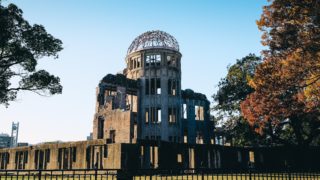“Kurashi-no-Techo” Magazine editor’s introduction (1991) to “The Delta of Hiroshima”
The author, Okada Haru, had come back to Hiroshima from Tokyo in March 1945 to escape from the intensifying air-raids. Her father soon died, followed by her mother in July. Her younger brother was away at war. Then the day of the atomic bomb came on August 6, 1945, when she was alone at home.
A split-second flash assailed the earth. People went up in flames, breathed their agonizing last and left their shadows on granite walls or else writhed in agony on the burnt sidewalk with their bodies hideously burnt beyond recognition.
Those still breathing were chased by intense fire, with their feet caught by human bones everywhere. The Dome instantly turned a skeleton, street buildings were crushed to piles upon piles of concrete bits, and houses spontaneously ignited.
One atomic bomb, dropped at 08:15 on August 6, 1945 on Hiroshima, emanated heat wave at 300,000 degrees Celsius, scorching Hiroshima out of existence.
Casualties amounted to 200,000 — 90% of the entire population of the city. Those who narrowly escaped from the jaws of death found themselves later severely suffering from a variety of after-effects, physical abnormalities. And they were tormented by anxiety of unstable living.
Forty-six long years have passed since the end of the last war, yet the agony of Hiroshima has not ended.
The world powers are still enchanted by nuclear weapons and continue to manufacture, test, possess and develop them.
That is why we cannot be insensitive to that day in Hiroshima and to the aspirations of Hiroshima, which the city has consistently appealed to since the end of the war.
On the anniversary of the atomic bombing in August, we, the editors of this magazine, are sending out a memoir with a deep feeling towards the abolition of nuclear weapons: The Delta of Hiroshima (Delta no Ki).
Translator’s notes:
(1) In 1945 my wife was living in Kokura, Kita-Kyushu. On August 9, three days after the drop of the fateful Hiroshima atomic bomb, Kokura was the next A-bomb target. However, thick clouds over Kokura on August 9 blinded the A-bomber, which was forced to change its target to Nagasaki. Thus, Kokura, by an unexpected turn of an event, was spared from the fateful A-bomb.
Earlier in June, 1944 the Kokura Army Armory, the biggest military weapon factory, was bombarded by B-24/B-29 bombers, resulting in the deaths of 80 civilians. Their dead bodies were assembled at Hiagari Elementary School’s open ground for a large number of neighborhood people to see. The sight of atrociously damaged and charred remains of the victims lined up on the school ground, even 79 years later vividly haunts her. The translator then in Tokyo likewise suffered severe B-29 bombardments twice, and moved to Saitama Prefecture.
(2) The translator hereby prays for all victims of the atomic bombs — either killed, wounded or otherwise tormented by them, and for the health of the 2nd- and 3rd-generations of the atomic victims.
(3) Acknowledgment: Hiroshi Takakusaki, GENSUIKYO; Michiko Murata, TOYUKAI; Fumio Takura; Chieko Mukoh.
Takao Mukoh was Professor of Business English at Osaka University of Foreign Studies (now a part of Osaka University). Mr. Mukoh, while at Waseda Univ. (anglo-american law), often worked as an interpreter for the U.S. Forces. Later he won the GARIOA-Fulbright scholarship and went to Univ. of Washington (Seattle, US) for 1-year (foreign trade and business communication). After 20 years with Mitsui Warehouse Co., he switched to language teaching at various colleges and institutions in the Kansai area. Later he was invited by the said OUFS to teach business communication in English. Later, he was invited to teach English and international business contracts at Ryutu Kagaku Daigaku (Distribution Science Univ.). Further, he was a consultant for international technological licensing and joint ventures. He published a variety of books on business communications, patent/know-how licensing agreements, and also translated into English the “Hagakure,” the code of Bushido (re-translated into German locally).

